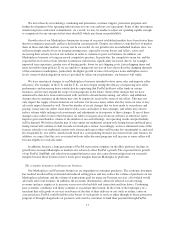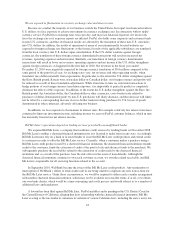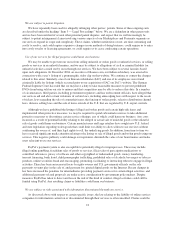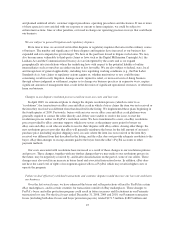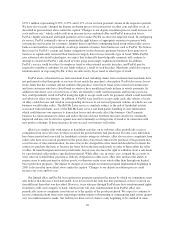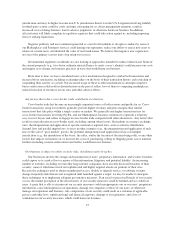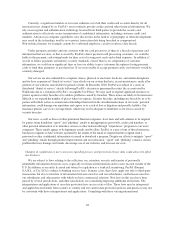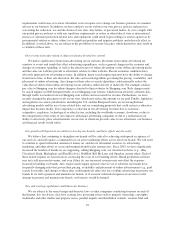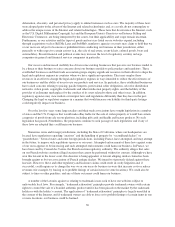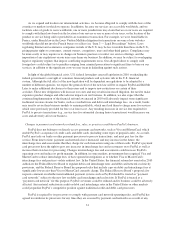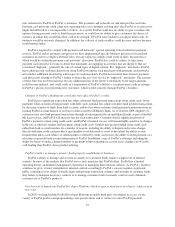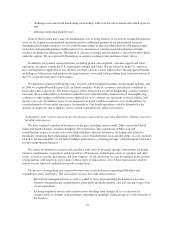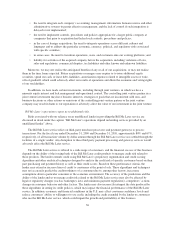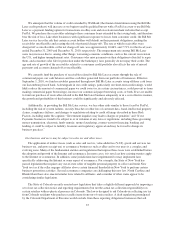eBay 2010 Annual Report Download - page 32
Download and view the complete annual report
Please find page 32 of the 2010 eBay annual report below. You can navigate through the pages in the report by either clicking on the pages listed below, or by using the keyword search tool below to find specific information within the annual report.jurisdictions and may be higher in some non-U.S. jurisdictions than it is in the U.S. Litigation involving liability
for third-party actions could be costly and time consuming for us, divert management attention, result in
increased costs of doing business, lead to adverse judgments, or otherwise harm our business. In addition,
affected users will likely complain to regulatory agencies that could take action against us, including imposing
fines or seeking injunctions.
Negative publicity and user sentiment generated as a result of fraudulent or deceptive conduct by users of
our Marketplaces and Payments services could damage our reputation, reduce our ability to attract new users or
retain our current users, and diminish the value of our brand names. We believe that negative user experiences
are one of the primary reasons users stop using our services.
Governmental regulators worldwide are also looking at approaches intended to reduce online fraud. Some of
the current proposals (e.g., two-factor authentication in France to verify a user’s identity) could increase our costs
and require us to change our business practices in ways that would harm our business.
From time to time, we have considered more active mechanisms designed to combat bad transactions and
increase buyer satisfaction, including evaluating sellers on the basis of their transaction history and restricting or
suspending their activity as a result. Our increased usage of these or other mechanisms to attempt to improve
buyer satisfaction could result in dissatisfaction on the part of sellers, loss of share to competing marketplaces,
reduced selection of inventory on our sites and other adverse effects.
Any factors that reduce cross-border trade could harm our business.
Cross-border trade has become an increasingly important source of both revenue and profits for us. Cross-
border transactions using our websites generally provide higher revenues and gross margins than similar
transactions that take place within a single country or market. We generally earn higher transaction fees for
cross-border transactions involving PayPal, and our Marketplaces business continues to represent a relatively
easy way for buyers and sellers to engage in cross-border trade compared with other alternatives. Any factors that
result in a net reduction in cross-border trade, including, among other factors, fluctuations in currency exchange
rates, the interpretation and application of specific national or regional laws, such as selective distribution
channel laws and parallel import laws, to users in other countries (e.g., the interpretation and application of such
laws to the sale of “gray market” goods), the potential interpretation and application of laws of multiple
jurisdictions (e.g., the jurisdiction of the buyer, the seller, and/or the location of the item being sold), or any other
factors that impose restrictions on, or increase the costs of, purchasing, selling or shipping goods across national
borders (including customs enforcement and tariffs) would harm our business.
Our business is subject to online security risks, including security breaches.
Our businesses involve the storage and transmission of users’ proprietary information, and security breaches
could expose us to a risk of loss or misuse of this information, litigation, and potential liability. An increasing
number of websites, including several other large internet companies, have recently disclosed breaches of their
security, some of which have involved sophisticated and highly targeted attacks on portions of their sites.
Because the techniques used to obtain unauthorized access, disable or degrade service, or sabotage systems,
change frequently and often are not recognized until launched against a target, we may be unable to anticipate
these techniques or to implement adequate preventative measures. If an actual or perceived breach of our security
occurs, the market perception of the effectiveness of our security measures could be harmed and we could lose
users. A party that is able to circumvent our security measures could misappropriate our or our users’ proprietary
information, cause interruption in our operations, damage our computers or those of our users, or otherwise
damage our reputation and business. Any compromise of our security could result in a violation of applicable
privacy and other laws, significant legal and financial exposure, damage to our reputation, and a loss of
confidence in our security measures, which could harm our business.
27


